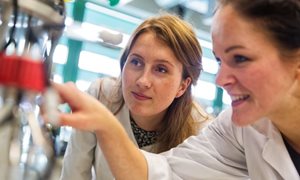Exchange students
Research Internships
Students from partner universities (Erasmus or bilateral agreements), as well as all EU students are welcome to do a research internship at Radboud University. read moreResearch Internships
For some students, this option can be combined with our English-taught courses also described on this website.To do an internship, you first need to find a supervisor or department that is willing to offer you a place to do your internship. Make sure you do your homework and find out about our departments, researchers and the topics they work on. The more detailed and motivated your request, the bigger the chance that you will be accepted by the department of your choice. When contacting an institute, make sure you have a strong motivation and mention that the Radboudumc international office will support you. Once you receive your approval, please make sure you contact the Radboudumc international office for students: internationalofficestudents@radboudumc.nlA good place to start looking for a supervisor is the website of one of our three research institutes:
Donders Center for Medical Neuroscience - DCMN
As part of the interfaculty Donders Institute for Brain, Cognition and Behaviour, DCMNs mission is to carry out world class research that advances our knowledge on how the nervous system develops and functions and how it is altered by disease, injury, genetic, and environmental factors such as stress.> www.ru.nl/donders
Radboud Institute for Health Sciences - RIHS
The Radboud Institute for Health Sciences aims to facilitate, through scientific training and research, essential successive steps in translating early biomedical discoveries into applied clinical practice and public health.> www.rihs.nl
Radboud Institute for Molecular Life Sciences-RIMLS
The Radboud Institute for Molecular Life Sciences aims to generate basic knowledge in molecular medical science and to translate this knowledge into clinical applications, the development of diagnostics and the treatment of patients through translational research programmes.> www.rimls.nl
Summer School
Lecturers and researchers from Radboud University and Radboudumc offer interesting courses in different disciplines during the summer holidays. They are suitable for Dutch and international Bachelor’s and Master’s students as well as PhD candidates.
visit websiteTaking courses Theoretical courses at the faculty of Medical Sciences
Students from partner universities (Erasmus or bilateral agreements) are very welcome to attend our English-taught courses in (bio)medicine. read moreTaking courses Theoretical courses at the faculty of Medical Sciences
Structure Bachelor’s courses Medicine and Biomedical sciences
Our Bachelor's courses are organised in quarters or semesters (10-week courses and 20-week courses). The approximate dates each year are:
Semester 1: Semester 2:
Q1: 1 September - 15 November Q3: 1 February - 15 April
Q2: 16 November- 31 January Q4: 16 April - 30 June
Most English taught courses, open for exchange students are offered In the third year medicine and biomedical sciences, mainly in the first semester and some in the first quarter of the second semester.
First semester courses (minors, Bachelor's)
First semester courses are 20 week minors for 12 EC's (European Credits), which are offered on Mondays and Tuesdays or on Thursdays and Fridays. This means you can combine one Monday-Tuesday minor with one Thursday-Friday minor. These courses are third year courses and are open to both Bachelor's and Master's students in Medicine and Biomedical sciences or related programmes.
An overview of the first semester minors can be found in the medicine prospectus.
Second semester courses (Q3, Bachelor's)
In Q3, so the first half of the second semester there is also one course available, open to students Medicine and Biomedical sciences or related programmes:
MED-MINK16 Principles and Practice of infectious Diseases
This course is full time, so cannot be combined with another course in the same quarter/semester.
Structure Master’s courses Biomedical sciences
The courses in our Master's programme in Biomedical Sciences are offered again in Monday-Tuesday courses (a) and Thursday-Friday courses (b). However, these courses last 4 weeks (1 period) and are 3 EC. You can choose one Monday-Tuesday course (a) and combine it with one Thursday-Friday course (b) during one period.
In some periods there is also a Wednesday course (c) available, 1.5 EC.
The periods roughly overlap with the months, so Period 1 is September, Period 2 is October and so on.
These courses are only open to students in a Master’s programme in Biomedical sciences or a related programme. An overview of all these courses can be found in the Biomedical sciences prospectus.
Contact
You can contact the international office on internationalofficestudents@radboudumc.nl with any questions you may have.
For more general information on studying as an exchange student at Radboud University, please visit the website of Radboud International.
Dentistry students
Foreign dental students may come to Nijmegen for exchange in their last year. Only final year students/students with sufficient clinical experience are accepted. read moreDentistry students
Dentistry students
Incoming exchange students can participate in (pre)clinical courses. In order to check the level of clinical experience, students first have to participate in preclinical courses in which they will be assessed by our preclinical teachers. If, according to the assessments, the students have the required level to treat patients, they can participate in clinical courses as well.
The modular curriculum design of the Dentistry programme allows for an intake of students from partner universities in September and March of the academic year, again on individual basis.
Additional information
- The Dentistry programme of Radboud University does not provide undergraduate courses in English.
- Part of the patient treatments will take place in a clinic in Arnhem (AKMA), a city near Nijmegen. This means that exchange students will have to travel to Arnhem during their exchange period, on average one day a week. Transport costs will most likely amount to € 35 – 50 per month and have to be borne by the student.
- The clinical practice dresscode is the same for the pre-clinical and the clinical rooms and involves wearing a white clinical coat, trousers and closed shoes with flat soles. You can borrow the clinical coat and trousers from the Dentistry programme.
- Exchange students will have to pass an infection prevention control test before they can access the clinic. This test will be arranged by our Dentistry programme during the first two weeks of your stay.
Contact us with further questions or for advice on Internationalofficestudents@radboudumc.nl
Degree seeking students

Bachelor's programs
Radboudumc collaborates with Radboud University to offer Bachelor's programs in the field of medical sciences.
read moreBachelor's programs
Radboudumc collaborates with Radboud University to offer three Bachelor’s programs. The information on these Bachelor's programs is in Dutch:
To participate in these programs you have to enroll at Radboud University. More information about the programs can be found on the university’s website.

Master’s programs
Radboudumc collaborates with Radboud University to offer three English-taught Master’s programs.
read moreMaster’s programs
English-taught Master's
Radboudumc collaborates with Radboud University to offer the following English-taught Master’s programs.
- Biomedical Sciences
- Molecular Mechanisms of Disease (selective Master’s)
- Cognitive Neuroscience (selective Master’s)
Dutch-taught Master's
There are also two Dutch-taught Master's connected to Radboudumc. The information on these Master's programs is in Dutch.
To participate in these programs you have to enroll at Radboud University. Per Master’s there are grants and funds available. More information on this can be found on the university’s website.
International Office
Need help? Please don't hesitate to contact someone at the International Office.




Living in Nijmegen
Nijmegen is the oldest city of the Netherlands, and has about 180,000 residents. It is located in the east of the Netherlands, but is closely connected by public transportation to the rest of the country.
read moreLiving in Nijmegen
In one hour you can in the heart of the country, Utrecht, and in one and a half hour you can be in Amsterdam. Nijmegen is also host to Radboud University, with which Radboudumc shares its name.
Municipality of Nijmegen
Much more can be told about Nijmegen as a city and its surroundings; however, rather than repeating information that can be found elsewhere on the Internet, we refer you directly to the website of the Municipality of Nijmegen, which tells about life in Nijmegen. On their pages you can also find information about working and doing business in Nijmegen. The City of Nijmegen has created an Expat Desk specifically for expatriates coming to or already living in Nijmegen; there you can ask all of your questions.

Dealing with the Dutch
You may have heard that Dutch people are well organized, that everyone speaks English; but also that the Dutch people are very direct and usually do not appreciate it if you drop by without letting them know far in advance. read moreDealing with the Dutch
What can you expect when you come to live and work in the Netherlands? There is a wealth of information online, and many forums can help with any questions you may have. Expatica is a good site. There are also a large number of books, like:- Dealing with the Dutch by Jacob Vossestein (ISBN 9068325655) offers a comprehensive and practical overview of Dutch culture
- The Low Sky by Han van der Horst (ISBN 9055941999) shows how Dutch culture was shaped by history, geography and more
- The Undutchables by Colin R. White & Laurie Boucke (ISBN 1888580224) a funny - yet superficial - view of Dutch culture from the perspective of expats

Radboud University
International Master's and Bachelor's students at Radboudumc will most probably be enrolled in or connected with Radboud University. The university offers a lot of extra information and services for international students.Dutch grading system
Dutch universities mark according to a system from 1 - 10. Half grades are sometimes awarded by adding 0.5 to the grade. read moreDutch grading system
Dutch universities mark according to a system from 1 - 10 (1 = abysmal, 10 = absolutely outstanding). Half grades are sometimes awarded by adding 0.5 to the grade. The grade 5.5 is, however, not awarded. Students in the Netherlands must gain at least a 6 to pass.Dutch grades 6 - 7
Satisfactory but no more than an average-to-reasonable level of performance, unexceptional, with scope for improvement.Dutch grades 7 - 8
Slightly to above-average, reflecting a good overall ability and grasp of the subject.Dutch grades 8 - 9
Well above average, demonstrating confidence and insight in handling the subject, almost excellent.Dutch grades 9 and over
Exceptional ability, indicating an outstanding grasp of the subject and originality.Grade and frequency
Description of the Dutch grading system with the frequency of marks awarded|
Grade |
Description |
Frequency |
|
1 |
No show |
No pass |
|
2 |
Very bad |
No pass |
|
3 |
Bad |
No pass |
|
4 |
Insufficient |
No pass |
|
5 |
Doubtful |
No pass |
|
6 |
Sufficient |
10-15% |
|
7 |
Fair |
40-50% |
|
8 |
(Very) good |
30-40% |
|
9 |
Excellent |
5-10% |
|
10 |
Exceptional |
1% |
